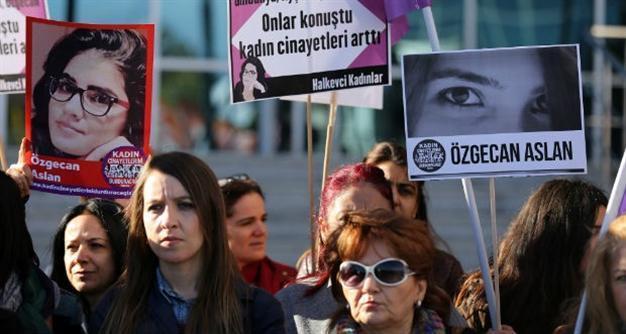Turkish court jails three to life for college girl's brutal murder
MERSİN – Doğan News Agency

AA photo
Three men have been sentenced to aggravated life in prison over the brutal murder of 20-year-old Özgecan Aslan in southern Turkey, in a ruling that delighted her family, friends, attorneys, and women’s rights activists.
The killing of Aslan after she was raped in a minibus on Feb. 11, 2015 caused outrage across Turkey and led to widespread protests. Her body was found burned in a forested area three days after she was reported missing by her family in Tarsus, a district in the southern province of Mersin.
The Tarsus 1st Criminal Court for Serious Crimes ordered Ahmet Suphi Altındöken, 26, the driver of the minibus, his father Necmittin Altındöken, 50, and his friend Fatih Gökçe, 20, to each serve life in jail, with no possible penalty reduction.
Those watching in the court during the hearing applauded after the announcement of the sentences on Dec. 3.
Ahmet Suphi Altındöken was charged with “murder with torture,” “murder to conceal criminal activity and/or destroy its evidence,” “murder emerging from the inability to commit a criminal act,” “attempted sexual violence” and “violation of another’s freedom with sexual motives.”
Gökçe and Necmittin Altındöken were charged with “murder with torture,” “murder to conceal criminal activity and/or destroy its evidence” and “murder emerging from the inability to commit a criminal act.”
Sevim Küçük, one of the attorneys representing the Aslan family, said during the court hearing that the three perpetrators should be given a major penalty, particularly noting that the three men had completely burned Aslan’s genitalia in an attempt to conceal the sexual violence they had committed.
Noting that lowered sentences in cases of women’s killings were notorious in Turkey, Küçük said the tough ruling was “significant.”
“The ruling has addressed all women fighting against women’s rights violations: From killings to violence. I’m calling on all women to join the fight against women’s rights violations,” she said.
Aslan’s mother said she had expected the ruling, but she urged the passing of a law to ban the lowering of sentences in women’s murder cases and cases of violence against women.
The court hearing was the third of the case and started at 9 a.m. in the Tarsus Courthouse. The courthouse only allowed entry to those directly involved in the case.
Security forces took strict measures ahead of the hearing, with water cannons and armored police vehicles present outside throughout the court sessions.
Around 300 representatives from several women’s groups and organizations gathered outside the courthouse and chanted slogans during the hearing. Peoples’ Democratic Party (HDP) deputy Meral Danış Beştaş was among those who took part in the demonstration.
Attorneys from Istanbul, Ankara, Mersin, the Aegean provinces of İzmir and Muğla, the Mediterranean province of Antalya, the southeastern province of Gaziantep, the northwestern province of Kırklareli and the Black Sea province of Samsun, had come to Tarsus to attend the hearing.
Aslan was a college student studying psychology when she was killed in February, her burnt body found in a riverbed in Tarsus two days after her parents had filed a missing person report with the police.
As the search for the missing girl was ongoing, gendarmerie forces stopped a suspicious minibus on Feb. 12, discovering blood stains and a hat inside. The two Altındökens and Gökçe were detained after the victim’s father spotted Aslan’s hat inside the minibus.
Gökçe and Ahmet Suphi Altındöken later confessed to the crime. According to their testimonies, after all other passengers disembarked from the minibus, Altındöken diverted from the scheduled route despite Aslan’s protestations and drove to a secluded spot.
Aslan fought back and used pepper spray after the men attempted to rape her. The driver then stabbed Aslan several times and hit her with an iron pipe, which killed her. He also allegedly cut off Aslan’s fingers in an attempt to ensure that no DNA match would be made with the scratches she made on his face during the struggle.
After the murder, Altındöken returned home with the woman’s body and asked his father and Gökçe to help dispose of the remains.
The three then tried to burn Aslan’s body to eliminate any evidence, but her remains were found on Feb. 13, 2015 after the three confessed to the killing and showed police the location where they had disposed of the body.
A close friend of Aslan who was with her on the day she went missing was unable to identify her badly disfigured body, but she said the clothes matched what Aslan was wearing on the day she disappeared.
“We were together at school until noon, then we went shopping, ate something and got on a minibus to go home,” she said.
“I got out near my home and she stayed on the minibus to go home. I learned later that she had not reached home and was missing,” she added.
